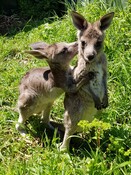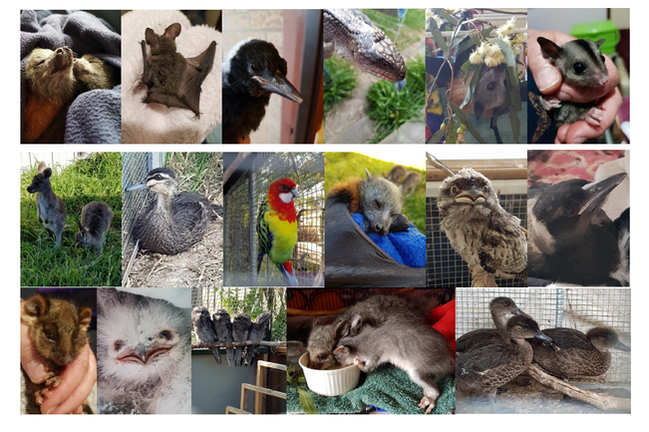
Good morning everyone although it is not such a good morning to many people or animals impacted by bush fires!
I have been asked by many people whether I am busy with animals from the bush fires and also people have been asking what to donate and who to donate to.
It is usually a disaster like the bush fires that brings the goodness out in people and gives them the desire to make a difference. I thought I would create this post to give a bit of an idea about what is happening around Victoria and also the country it would seem.
Wild Days is inundated with animals at the moment, with over 110 individual animals currently in care, and more arriving daily. Yesterday another 4 arrived, a ringtail, a tawny frogmouth, a rainbow lorikeet and a mudlark.
The huge number of animals coming into my care and that of many other carers, are not bush fires, but they are the result of the extreme weather we have been having, the extreme heat days, the sudden storms etc. I get animals with burns on their feet, not from fire, but from running on a hot garage roof for example, then are unable to climb and are subsequently attacked or injured in some other way. I have many mums with bubs in their pouches impacted by heat stress, unable to continue to produce milk. I have many bats (endangered grey headed flying foxes) in care at the moment, the survivors from the horrific heat days where, over the last couple of weeks around 6000 baby flying foxes have died. Then there are the animals that come in with road trauma, cat attack and human intervention.
I am outside of the fire area and any animals that come in from the fires will as a rule go to the closest carers to the location the animal was found, providing they are safe. Unfortunately, a very high percentage of animals that are rescued from fire grounds will be put to sleep. Most have inhaled heat, smoke and some fire, burning their insides. Others have burns on their feet from going onto hot ash and those burns travel up their legs. Sadly, most cannot be saved.
The media show animals to give hope but the reality is that most will not have a good prognosis from the outset.
Such a horrible time. Everyone is working together though. Carers and rescuers and supporters all helping one another.
For anyone wanting to know how to help, my suggestion would be to share it around. Maybe if you are able to donate, split your donation between the fire impacted organisations and possibly your local wildlife shelter. Possibly make a decision to continue to make small donations throughout the year. Every carer is doing what they are doing on a voluntary basis and it is expensive. They are all individually licensed and are separate from the rescue groups. Wildlife shelters take in animals all year, all times of the day and night, and not just during times of fires. They take in animals from the rescue groups, from vets or direct from the public. Maybe this is a good time to make that connection and show your support.
Depending on the animals being cared for in your local wildlife shelter, carers are always in need of fresh gum leaves, fruit such as apples (particularly fruit with the bats in care), vegetables such as sweet potato and carrots, and other stuff like duck crumble, oats, trail mix. It differs depending on the animals. Some wildlife shelters specialize and only do one or two species. Monetary donations are the most in need as many animals require expensive specialized formulas.
At Wild Days we have many animals and many species and the need for foods and other items is a huge ongoing expense.
These are some photos of the different animals at Wild Days at the moment, to give you an idea of what recovering wildlife looks like. Everything in the photos will be eventually released back to the wild.
If you feel you would like to contribute to the care and rehabilitation of the animals at Wild Days, you will find the bank details below.
There are many dedicated wildlife carers who could use your support for the animals they are saving.
Thanks.
Kay
Wild Days Wildlife Shelter
"Care, Respect, Freedom"
www.wilddaysws.org
********************************************************************
Donations can be made directly into Wild Days dedicated bank account:
K.Taranto, Commonwealth Bank,
BSB 062692 Acc 1370 8784
Or visit the How to Help page on our website.
Any donation big or small will help and will be used directly for the care of the animals.
Please include your name in the reference of the deposit and text or email your details to me so that I know who is helping our wildlife. Many thanks.
I have been asked by many people whether I am busy with animals from the bush fires and also people have been asking what to donate and who to donate to.
It is usually a disaster like the bush fires that brings the goodness out in people and gives them the desire to make a difference. I thought I would create this post to give a bit of an idea about what is happening around Victoria and also the country it would seem.
Wild Days is inundated with animals at the moment, with over 110 individual animals currently in care, and more arriving daily. Yesterday another 4 arrived, a ringtail, a tawny frogmouth, a rainbow lorikeet and a mudlark.
The huge number of animals coming into my care and that of many other carers, are not bush fires, but they are the result of the extreme weather we have been having, the extreme heat days, the sudden storms etc. I get animals with burns on their feet, not from fire, but from running on a hot garage roof for example, then are unable to climb and are subsequently attacked or injured in some other way. I have many mums with bubs in their pouches impacted by heat stress, unable to continue to produce milk. I have many bats (endangered grey headed flying foxes) in care at the moment, the survivors from the horrific heat days where, over the last couple of weeks around 6000 baby flying foxes have died. Then there are the animals that come in with road trauma, cat attack and human intervention.
I am outside of the fire area and any animals that come in from the fires will as a rule go to the closest carers to the location the animal was found, providing they are safe. Unfortunately, a very high percentage of animals that are rescued from fire grounds will be put to sleep. Most have inhaled heat, smoke and some fire, burning their insides. Others have burns on their feet from going onto hot ash and those burns travel up their legs. Sadly, most cannot be saved.
The media show animals to give hope but the reality is that most will not have a good prognosis from the outset.
Such a horrible time. Everyone is working together though. Carers and rescuers and supporters all helping one another.
For anyone wanting to know how to help, my suggestion would be to share it around. Maybe if you are able to donate, split your donation between the fire impacted organisations and possibly your local wildlife shelter. Possibly make a decision to continue to make small donations throughout the year. Every carer is doing what they are doing on a voluntary basis and it is expensive. They are all individually licensed and are separate from the rescue groups. Wildlife shelters take in animals all year, all times of the day and night, and not just during times of fires. They take in animals from the rescue groups, from vets or direct from the public. Maybe this is a good time to make that connection and show your support.
Depending on the animals being cared for in your local wildlife shelter, carers are always in need of fresh gum leaves, fruit such as apples (particularly fruit with the bats in care), vegetables such as sweet potato and carrots, and other stuff like duck crumble, oats, trail mix. It differs depending on the animals. Some wildlife shelters specialize and only do one or two species. Monetary donations are the most in need as many animals require expensive specialized formulas.
At Wild Days we have many animals and many species and the need for foods and other items is a huge ongoing expense.
These are some photos of the different animals at Wild Days at the moment, to give you an idea of what recovering wildlife looks like. Everything in the photos will be eventually released back to the wild.
If you feel you would like to contribute to the care and rehabilitation of the animals at Wild Days, you will find the bank details below.
There are many dedicated wildlife carers who could use your support for the animals they are saving.
Thanks.
Kay
Wild Days Wildlife Shelter
"Care, Respect, Freedom"
www.wilddaysws.org
********************************************************************
Donations can be made directly into Wild Days dedicated bank account:
K.Taranto, Commonwealth Bank,
BSB 062692 Acc 1370 8784
Or visit the How to Help page on our website.
Any donation big or small will help and will be used directly for the care of the animals.
Please include your name in the reference of the deposit and text or email your details to me so that I know who is helping our wildlife. Many thanks.


 RSS Feed
RSS Feed
